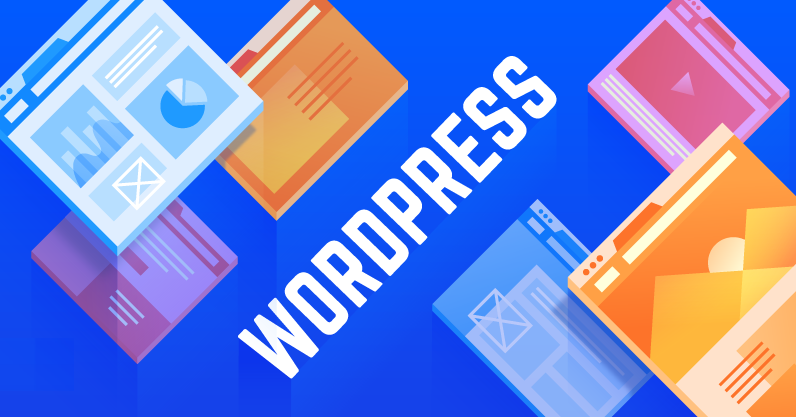What is WordPress?
For those of you unfamiliar with WordPress, WordPress is a CMS, or content management system. A content management system allows you to edit and alter the appearance of your website, without having to use code.
Think of something like Microsoft Word for websites, with an absolute ton of extra features and the ability to drag and drop blocks of functionality for your website, and you might be along the right lines.
Well if we define a CMS, and WordPress specifically as:
“A content management system or CMS is a software that facilitates creating, editing, organizing, and publishing content. WordPress is a Content Management System, that allows you to create and publish your content on the web. Although it is mostly used for web publishing, it can be used to manage content on an intranet, or in a single computer.”
A lot of businesses and startups don’t know how great WordPress is, or why they should use WordPress for business, so in this article we’re going to tell you why you should use WordPress for your business or startup website.
Aside from the fact that WordPress and WordPress are free, WordPress is awesome. It’s easy to use, super powerful and you can do just about anything with it.
Not only that, but there’s a huge WordPress developer community, countless tutorials, guides, videos, ebooks and even entire businesses dedicated to helping you grow and maintain your WordPress website.
Why use WordPress?
So begins the never ending list of cool reasons you should use WordPress for your business website, strap in, and try not to wet yourself in excitement (just kidding).
It’s free
WordPress is a free to use CMS system that can be installed on any website.
WordPress is officially free to Use
Unlike some other online platforms, WordPress itself is absolutely free to use, officially and forever. You are not limited to personal blogs — it is a great solution even for commercial projects. Yes, there are some paid plugins and themes but they are all additional services.
Create a website of any type and complexity
With WordPress, you were able to build a personal blog, corporate portal, online store, news site, and many more. A lot of well-known media and corporations use WordPress for their websites visited by millions of people every day.
A variety of customization options
To configure the interface, there are a lot of free and paid options. Moreover, the third party plugins allow expanding the website functionality.
A huge number of templates
WordPress offers a large selection of themes that meet any needs, and thanks to them you can make your website or blog exactly in a way you see it. All themes are easily customizable and most of them allow you to change the individual elements: backgrounds, colors of individual blocks, logos, menus, sliders and so on. That’s why it is absolutely not difficult to make a beautiful site on WordPress.
Ability to use multiple plugins
Official WordPress portal offers to download almost 35 thousand various plugins. They are available at https://wordpress.org/plugins page. If you feel good with the standard blog functionality, it is possible not to use plugins at all. However, they have been installed almost on any WordPress website or blog. Since this allows you to make your blog more convenient and expand its functions and capabilities.
Control over SEO
The WordPress website owner always has an opportunity to keep an eye on the ball in terms of SEO of the resource. WordPress was originally created as a very flexible system with various settings, including those relating to SEO. However, to improve the search engine friendliness to the site, you can use special plugins, for example, SEO WordPress by Yoast, All in one SEO Pack, SEO Ultima.
Regular updates
WordPress is a system that constantly offers a lot of updates for templates, plugins, and the core itself. This allows you to expand the site functionality, improve the design. In addition, there are also WordPress communities and a large number of forums where you can chat with other users or ask for advice. As there are a lot of WordPress developers, you will easily find the necessary solution.
“WordPress is used by 60.3% of all the websites whose content management system we know. This is 30.2% of all websites.”
If having 30% of all websites on the web powered by WordPress wasn’t testimonial enough and you are still asking yourself why use WordPress, let me tell you that it also powers the websites of some of the worlds biggest brands, including TechCrunch, MTV,Sweden.se, Microsoft, Facebook News and Vogue.
“WordPress is an open source software. It is free in the sense of freedom not in the sense of free beer. You may ask what is the difference between these two? Open Source software comes with freedom for you to use, modify, build upon, and redistribute the software in any way you like.”
It has themes and frameworks
WordPress runs on themes and frameworks.
What’s a theme or framework? We hear you ask, in barely contained excitement.
Well, there are lots of quite technical definitions of what a WordPress theme is. We found this gem from WordPress.org for example:
“A WordPress Theme is a collection of files that work together to produce a graphical interface with an underlying unifying design for a weblog. These files are called template files. A Theme modifies the way the site is displayed, without modifying the underlying software.”
We had a go at defining it and we came up with:
“A WordPress theme is a collection of code, functionality and styles that you can install onto your website in the form of a theme. Installing this Theme on your WordPress website allows you to access and use the functionality and styles of the Theme using the WordPress CMS interface, page builders and any plugins provided by your theme, without having to touch any of the code.”
Whichever way you look at it, WordPress is the foundation your website is built on. The WordPress theme or framework you choose is the toolkit you decide to build your website with.
Understanding WordPress themes
WordPress themes are the best thing to ever happen for small businesses as far as web development goes.
The best WordPress themes on the market provide you with tens of thousands of pounds of development work for between $50–250. These are called premium themes that you can purchase from theme marketplaces like Themeforest.
The value included within these themes is incalculable. Themes like Divi, and Avada which contain thousands and thousands of hours of work from skilled designers, developers.
Out of the box, these premium Themes can be used to build just about anything.
They come with built in easy to use page builders, are fully responsive, bundled with amazing plugins, contain infinite styling and customization options and tons of easy to install demos.
It’s easy to use
WordPress is intuitive and easy to use. It might seem a little daunting at first, because it’s not pretty looking like Shopify, and doesn’t spend millions of dollars on marketing and pretty pictures of business owners working 4 hours a week on a beach while their drop shipped doggie t-shirt store makes them millions, but, once you get beyond the initially sparsely designed interface, you’ll realise that WordPress is incredibly easy to use.
You can access and edit basically everything you would need to from the WordPress CMS, and if you find something you can’t, there’s generally a plugin you can install that will help you.
Unlike closed CMS systems like Shopify or Wix, where you are limited in what you can edit and access, WordPress is an open CMS system where you can edit and access everything!
You don’t need to touch any code
WordPress is designed so that you don’t need to touch any code, if you don’t want to. WordPress Themes are designed to work with the WordPress CMS interface, so that they plugin and make available their functionality via the WordPress backend and built in page builder of your theme.
You can purchase any number of out the box themes from marketplaces like Themeforest, who have specific themes for certain industries, and also many popular all purpose themes that come with built in page builders that are easily scalable.
Once you have purchased a theme, all you need to do is upload and install the zipped WordPress theme file on your website. This will give you the ability to activate and use the built in modules and page builder of your theme so you can start building your website without any code.
It’s scalable
WordPress is scalable. You don’t need to pay an extra $100 per month once you reach a certain level of traffic, or if you want to add on or unlock new functionality like it’s some video game purchase.
WordPress is typically installed directly onto your domain and all you need to pay for is your domain and hosting. You can get inexpensive WordPress hosting packages starting from a few dollars per month, and as you scale you can get high quality professional hosting plans for not much more.
It’s responsive!
It’s 2019 so by now your website should definitely be mobile and tablet friendly. If it isn’t, come on!
There’s no excuse for not having a responsive website in 2019, yet somehow back in 2015, which isn’t that long ago relatively speaking, only 11.5% of businesses had a responsive website, according to Search Engine Land.
By default, any correctly coded WordPress theme should be fully mobile responsive. Make sure you read the specifications of your Theme before you purchase.
We have yet to see a good premium theme that isn’t responsive, so if you do your homework and buy a well reviewed, well recommended theme, your website will be built using a responsive web design framework.
There are tons of free tutorials and guides
As WordPress has the largest CMS market share, it also has the largest library of tutorials, guides and how to content, which makes WordPress maintenance a lot easier too.
Some great resources for free WordPress tutorials and guides are:
Or, you can just watch our free video course — How To Build A WordPress Website — which contains 3 hours of video tutorials that I have created aimed at small business owners, freelancers and marketers.
It’s built for delegation
The whole team can use WordPress. WordPress comes with a built in users section that makes it easy to delegate access to new users based on the level of access it’s appropriate to assign.
What can you build with WordPress?
With WordPress you have the power to build something as simple as a blog, or as complicated as a multi vendor marketplace with Woocommerce .
Here are a list of some things you can build with WordPress:
- Build a one page website or landing page.
- Build a professional business website.
- Build a blog.
- Build a landing page.
- Build a sales page.
- Build aportfolio.
- Build a resume.
- Build a directory website.
- Build an online store with Woocommerce.
- Build a multi vendor marketplace with Woocommerce Product Vendors.
- Build a course based online learning platform with Woocommerce Sensei.
- Build a membership subscription website with Woocommerce Memberships.
- Build a booking website with Woocommerce Bookings.
The list is endless. Anything you can think of, chances are there’s a plugin, extension or some open source code to get you on your way.
It integrates with everything
As WordPress is the most commonly used CMS in the world, it integrates with everything (near enough). If there’s a service you’d like to integrate with your website, chances are there will be a WordPress plugin, or at the least an easy to use API.
For example, here are some of the most popular services that integrate with your WordPress website:
If you can’t integrate it, you can inte-plug it.
O.k that awful sub heading aside, PLUGINS.
For everything else you could want to add on to your WordPress website, there’s a plugin.
Plugins are a big part of really what makes WordPress so great.
“Plugins extend and expand the functionality of WordPress.”
Pretty short and sweet right? Plugins are little magical boxes of functionality that you can install on your website to add on ready to go functionality.
More cool WordPress plugins
If those weren’t enough for you, here are a collection of some WordPress plugin lists you can look through to see if there’s anything else that may be useful for your business.
29 Must Have WordPress Plugins
This Article came from one of our best reading guides here.
If you need any guides or help regarding wordpress and how to start, just leave a comment or email us at hello@comingpost.com.











